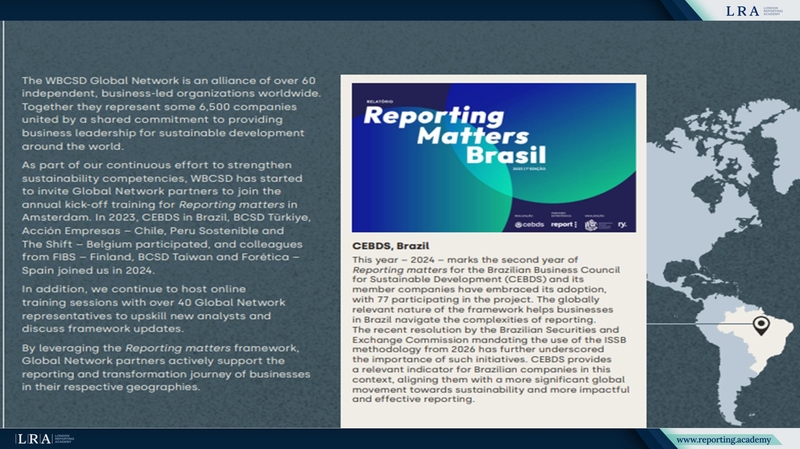Reporting Matters 2024: Changing Gears in Sustainability Reporting

The World Business Council for Sustainable Development (WBCSD), in partnership with Radley Yeldar, has unveiled the 2024 edition of its renowned initiative, Reporting Matters. This year’s report, titled Changing Gears: How are companies navigating higher expectations and demands in sustainability reporting?, delves into the challenges and strategies shaping the future of corporate sustainability disclosures.
The "Reporting Matters 2024" report reflects the significant developments in sustainability reporting globally, with a focus on the growing importance of standardized frameworks and the integration of sustainability into business strategies.
Key highlights and insights:
- Regional Reporting Trends:
- In Brazil, the Brazilian Business Council for Sustainable Development (CEBDS) has seen growing participation in its Reporting Matters initiative, now involving 77 companies. The Brazilian Securities and Exchange Commission's mandate for ISSB methodology from 2026 further strengthens the relevance of such initiatives.
- In Turkey, BCSD Türkiye has been implementing Reporting Matters since 2017, expanding from 23 to 75 companies by 2023. The introduction of new standards and focus areas, such as target setting and biodiversity, continues to drive improvements in corporate sustainability reporting.
- Mandatory vs. Voluntary Reporting:
- Global Shift: The report emphasizes the transition from voluntary to mandatory reporting, driven by evolving regulatory landscapes, such as the EU CSRD and IFRS alignment. This shift is pushing businesses to enhance transparency and sustainability disclosures, providing stakeholders with more comparable and impactful data.
- Materiality: The rise of double materiality reporting is evident, with 77% of reports disclosing this approach, a 22% increase from 2023. This aligns with emerging regulations and investor expectations, particularly related to climate and biodiversity.
- Frameworks & Standards:
- There has been a steady increase in the adoption of various sustainability frameworks, such as the TCFD, SASB, and TNFD, with more companies referencing these in their reports. Notably, the EU Taxonomy and CSRD have gained prominence, especially in the EMEA region, where 72% of companies report using these frameworks.
- The Science Based Targets Network (SBTN) also saw a notable uptick in references, reflecting companies' commitment to setting science-based targets in line with global sustainability goals.
- External Assurance:
- Over 90% of reports include external assurance, with 80% at a limited level and a growing number incorporating reasonable assurance. The trend toward higher assurance levels is expected to continue, particularly as CSRD regulations require reasonable assurance in the future.
- Sustainability Governance:
- More companies are embedding sustainability into their governance structures. The percentage of companies reporting on sustainability responsibilities at the board or executive level has risen to 32%, highlighting the growing importance of top-level accountability. Additionally, 73% of reports now link executive compensation to sustainability performance.
- Integration and Timeliness:
- Self-declared integrated reports are gaining traction, with 27% of reports now considered integrated. This reflects a broader trend toward combining non-financial and financial disclosures. Timeliness of sustainability reporting remains consistent, with most reports published within 1-3 months of the financial year-end.

Source: WBCSD' Report Reporting Matters 2024
Advantages of Reporting Matters 2024 for Business Management and Growth
The Reporting Matters 2024 report highlights significant trends and practices that offer businesses a strategic advantage in the evolving landscape of sustainability and corporate governance. Here are the key areas where the report can help businesses thrive:
- Enhanced Stakeholder Trust
By adopting double materiality and aligning with global reporting frameworks like SASB and TCFD, companies demonstrate transparency and accountability. This fosters trust among investors, regulators, and consumers, ultimately strengthening brand reputation and long-term sustainability. - Improved Decision-Making
The report's focus on the integration of sustainability factors into executive compensation and performance management enables businesses to link environmental, social, and governance (ESG) metrics with business outcomes. This alignment drives better decision-making, ensuring that sustainability goals are met alongside financial targets. - Adaptability to Changing Standards
Reporting Matters 2024 highlights the growing importance of dynamic processes in tracking evolving material topics. By incorporating real-time monitoring of ESG factors, businesses can adapt to changing market conditions and stakeholder expectations, staying ahead of regulatory demands and market trends. - Stronger Corporate Governance
The increased adoption of external assurance for key performance indicators ensures that businesses provide reliable, verified data. This enhances the credibility of sustainability reports and supports more robust governance practices, making companies more attractive to investors and partners. - Strategic Competitive Advantage
By aligning with the latest standards and frameworks, such as the TNFD and SBTN, businesses can stay at the forefront of emerging sustainability trends. This positioning not only meets current regulatory requirements but also prepares companies for future demands in a rapidly changing business environment.
In summary, Reporting Matters 2024 provides businesses with a comprehensive roadmap to integrate sustainability into their core strategies, improve operational transparency, and enhance stakeholder engagement, all of which contribute to sustainable growth and profitability.
Download document to review all the details:



